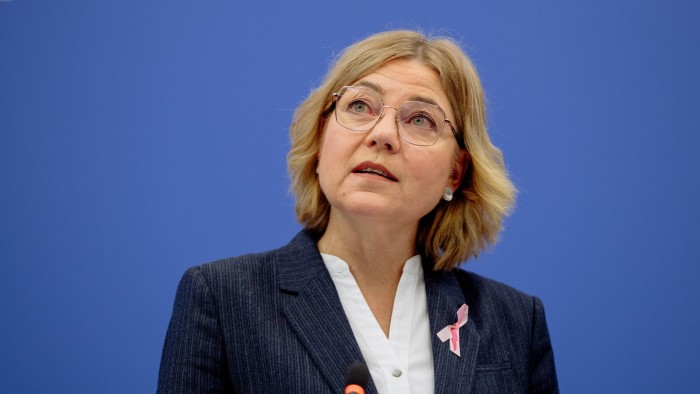Unlock the Editor’s Digest for free
Roula Khalaf, Editor of the FT, selects her favourite stories in this weekly newsletter.
Europe’s surge in defence spending must also fund “disruptive” technologies such as artificial intelligence and quantum computing that can have military applications, the EU’s tech chief has said.
Russia’s war against Ukraine and US President Donald Trump’s oscillating support for defending the continent have prompted a historic increase in military expenditure and investment in the arms industry. Some 10 per cent of that funding should be funnelled to nascent technologies developed in the EU, according to the bloc’s technology and security commissioner Henna Virkkunen.
“It’s very important for the European Union to be sure that . . . our defence industry is competitive in the future,” she told the Financial Times. “We want to now encourage the member states to invest a bigger part, 10 per cent, to these disruptive technologies.”
Under a defence industry “road map” to be put forward by the European Commission on Wednesday, defence procurement rules are set to be upgraded next year to make it faster and easier for smaller companies to win contracts and favour more European companies.
“We want to especially boost our European technologies and European defence industry with these actions,” Virkkunen said. “It’s very important to look at the security aspect nowadays and that’s why we have to of course look from where we are buying different products.”
Borrowing from Ukraine’s wartime experience where small-scale manufacturers have developed critical weapons systems such as drones used by the country’s armed forces, Brussels seeks to link deep-tech start-ups with traditional arms manufacturers, Virkkunen said. This would allow ideas to flow from labs and innovators faster into procurement pipelines, she argued.
The initiative is part of a number of new EU proposals aimed at making the bloc more competitive on the global stage and reducing its reliance on products developed in the US and China. The EU has also sought to spur the creation of an “AI continent” after falling behind Beijing and Washington in the rollout of generative AI and robotics.
Recommended
Virkkunen said that since Russia’s 2022 invasion of Ukraine, more than 230 defence start-ups have been created in the EU. To help them scale up, the commission will launch a €1bn “fund of funds”, backed by the European Investment Bank, she said. Finding sources of capital is one of the key hurdles for defence innovators.
Virkkunen said Ukraine’s battlefield had become “a test bed for new technologies”, offering lessons for the EU on how to accelerate innovation cycles. Brussels is already co-operating with Kyiv on defence tech.
Others, however, have sounded a note of caution, pushing back at the notion that too much money was being poured into conventional systems.
One of Germany’s top procurement officials, vice admiral Carsten Stawitzki, warned on Tuesday that Ukraine was “not a blueprint” for European rearmament.
Ukraine had been forced to produce millions of drones, he told the Berlin Security Conference, being held 18-19 November, as a “workaround” because it was lacking the capabilities western armies have.
While he stressed he was “not a dinosaur” and supported the adoption of innovative technologies, Stawitzki said that in the short term Germany was prioritising capabilities such as a shared nuclear deterrent, fighter jets and long-range missiles capable of striking deep into enemy territory — weapons that “our Ukrainian friends unfortunately don’t have”.
Additional reporting by Laura Pitel in Berlin


